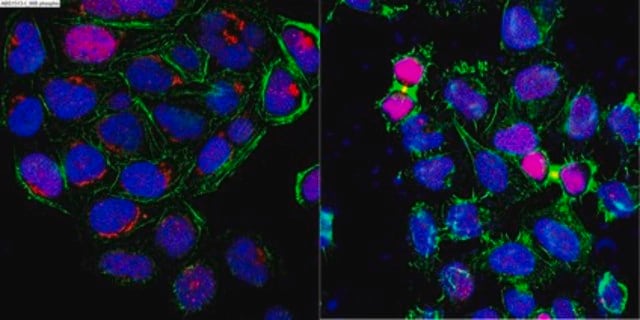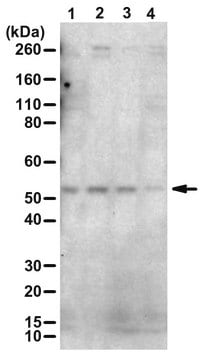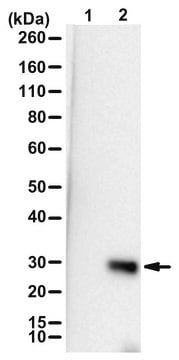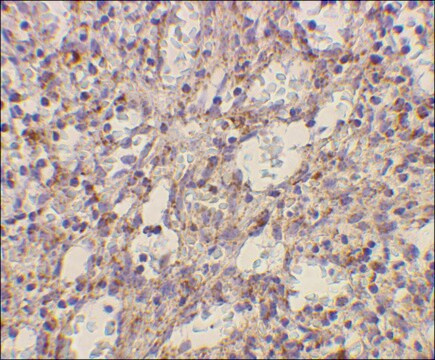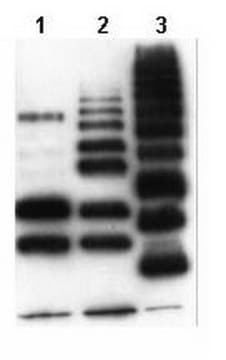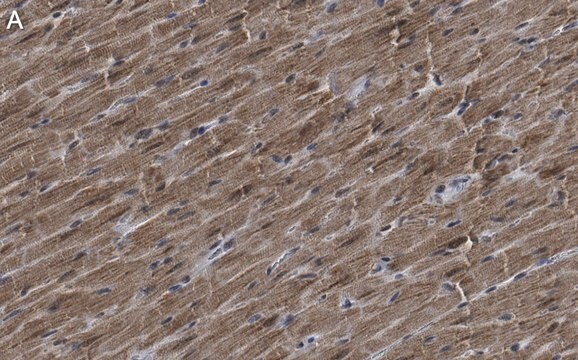ZRB1494
Anti-p-Ubiquitin (pSer65) Antibody, clone 2N21 ZooMAb® Rabbit Monoclonal

recombinant, expressed in HEK 293 cells
Szinonimák:
Ub
About This Item
ICC
WB
affinity binding assay
inhibition assay
recombinant monoclonal
flow cytometry: suitable
immunocytochemistry: suitable
inhibition assay: suitable (peptide)
western blot: suitable
Javasolt termékek
biológiai forrás
rabbit (recombinant)
Minőségi szint
rekombináns
expressed in HEK 293 cells
konjugátum
unconjugated
antitest forma
purified antibody
antitest terméktípus
primary antibodies
klón
2N21, monoclonal
recombinant monoclonal
termékcsalád
ZooMAb® learn more
Forma
lyophilized
faj reaktivitás
human
faj reaktivitás (homológia által előrejelzett)
mouse, rat
kiszerelés
antibody small pack of 25 μL
környezetbarátabb alternatív termék tulajdonságai
Waste Prevention
Designing Safer Chemicals
Design for Energy Efficiency
Learn more about the Principles of Green Chemistry.
fejlettebb validálás
recombinant expression
Learn more about Antibody Enhanced Validation
sustainability
Greener Alternative Product
technika/technikák
affinity binding assay: suitable
flow cytometry: suitable
immunocytochemistry: suitable
inhibition assay: suitable (peptide)
western blot: suitable
izotípus
IgG
UniProt elérési szám
környezetbarátabb alternatív kategória
kiszállítva
ambient
tárolási hőmérséklet
2-8°C
célzott transzláció utáni módosítás
phosphorylation (pSer65)
Általános leírás
Each ZooMAb antibody is manufactured using our proprietary recombinant expression system, purified to homogeneity, and precisely dispensed to produce robust and highly reproducible lot-to-lot consistency. Only top-performing clones are released for use by researchers. Each antibody is validated for high specificity and affinity across multiple applications, including its most commonly used application. ZooMAb antibodies are reliably available and ready to ship when you need them.
Learn more about ZooMAb here.
Egyediség
Immunogén
Alkalmazás
Flow Cytometry Analysis: 0.1 μg from a representative lot detected p-Ubiquitin (pSer65) in one million PC-3 cells treated with CCCP.
Peptide Inhibition Assay: Target band detection in lysate from HeLa cells transfected with PINK and treated with CCCP (15 mM, 5 h) was prevented by preblocking of a representative lot with the phosphorylated Ser 65 ubiquitin peptide, but not by corresponding non-phosphopeptide.
Immunocytochemistry Analysis: A 1:100 dilution from a representative lot detected p-Ubiquitin (pSer65) in HeLa cells transfected with PINK and treated wtih CCCP.
Affinity Binding Assay: A representative lot of this antibody bound phosphorylated serine 65 Ubiquitin peptide with a KD of 2.5 x 10-8 in an affinity binding assay.
Note: Actual optimal working dilutions must be determined by end user as specimens, and experimental conditions may vary with the end user
Cél megnevezése
Fizikai forma
Feloldás
Tárolás és stabilitás
Jogi információk
Jogi nyilatkozat
Nem találja a megfelelő terméket?
Próbálja ki a Termékválasztó eszköz. eszközt
Tárolási osztály kódja
13 - Non Combustible Solids
WGK
WGK 2
Lobbanási pont (F)
Not applicable
Lobbanási pont (C)
Not applicable
Válasszon a legfrissebb verziók közül:
Analitikai tanúsítványok (COA)
Nem találja a megfelelő verziót?
Ha egy adott verzióra van szüksége, a tétel- vagy cikkszám alapján rákereshet egy adott tanúsítványra.
Már rendelkezik ezzel a termékkel?
Az Ön által nemrégiben megvásárolt termékekre vonatkozó dokumentumokat a Dokumentumtárban találja.
Tudóscsoportunk valamennyi kutatási területen rendelkezik tapasztalattal, beleértve az élettudományt, az anyagtudományt, a kémiai szintézist, a kromatográfiát, az analitikát és még sok más területet.
Lépjen kapcsolatba a szaktanácsadással